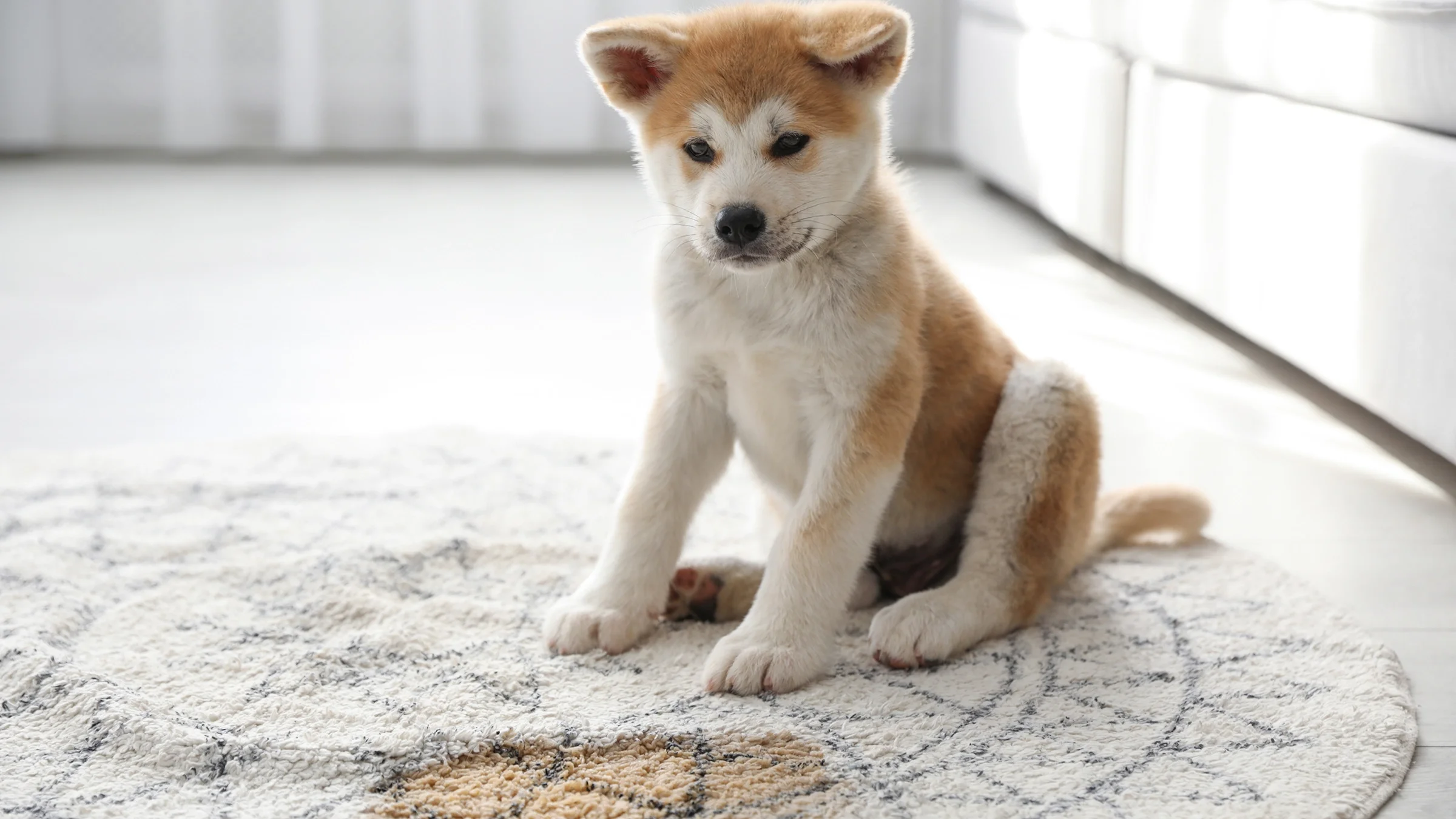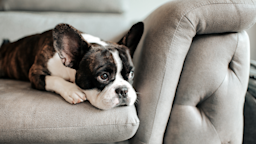Key takeaways:
There are many reasons why your dog might poop in the house, including physical issues, like intestinal parasites and food allergies, and environmental factors like stress.
Disciplining a dog who poops in the house isn’t helpful or effective, especially if the dog can’t help pooping because of a physical issue.
Your veterinarian can thoroughly examine your dog to help determine the cause of their pooping.
It can be frustrating to discover that your dog left you a “present” on the floor while you were out of the house. While you might be tempted to discipline or yell at your dog, that won’t help prevent future accidents.
If your dog is repeatedly pooping in the house, you’ll need to identify the cause before being able to effectively prevent the behavior.
Reasons why your dog may be pooping in the house
There are many potential reasons why your dog may be pooping in the house. Below, we discuss nine of them.
Search and compare options
1. Intestinal parasites
Intestinal parasites can make it difficult for dogs to control their bowels, leading to accidents in the home. For example, Giardia, a parasitic infection, can cause acute or sudden diarrhea. It may also cause abdominal discomfort and watery poops, leading to dogs having an accident before they’re able to make it outside.
2. Separation anxiety
If your dog gets stressed when you leave the house, they may have accidents while you’re gone. Separation anxiety can cause dogs to panic, cry, run, and bark while their owners are away. And some dogs work themselves up so much that they have accidents in the house. Highly stressed dogs may also destroy their owners’ belongings.
3. Outdoor stressor or loud noise
Many dogs fear the sound of thunder or fireworks. They can get so stressed out that they may react by pacing, trembling, and destroying things. They may also resist going outside because they associate the outdoors with the scary noise.
4. Left in the house too long
Dogs may have accidents in the house when they have been inside too long and need to poop. While your dog’s poop schedule depends on the type of food and how much of it they’re eating, most dogs need to poop one to two times a day. A dog eating a high-fiber diet may need to poop three times a day.
5. Food allergies
Food allergies can cause many different symptoms in dogs, including gas and diarrhea. If dogs have a sudden episode of diarrhea, they may not be able to get outside in time and might have an accident in the house.
6. Inflammatory bowel disease
Your dog may have a medical condition like inflammatory bowel disease (IBD). IBD symptoms include vomiting, diarrhea, and a loss of bowel control. If you suspect IBD, take your dog to the vet. They can run tests and recommend treatments like probiotics, home-prepared meals, or medications.
Read more like this
Explore these related articles, suggested for readers like you.
7. Age-related issues
As dogs get older, they may have age-related issues that lead to accidents in the house. Older dogs can experience decreased muscle strength that leads to incontinence. Some are also affected by nerve damage in their spinal cord that weakens muscles and makes it difficult to control bowel movements.
An older dog repeatedly pooping or peeing in the house can also be a sign of senior dog dementia. As dogs age, they may start to become more easily confused, have difficulty hearing, and/or go on midnight walks through the home. That general confusion can cause dogs with dementia to poop and pee in the house, too.
8. Dietary changes
Dogs can get sick when their food is changed quickly, potentially leading to accidents in the house. To prevent an upset stomach when putting your dog on a new diet, it’s best to slowly mix a bit of the new food into their old food, gradually transitioning them over a 7-day period (or longer).
9. Incontinence
Fecal incontinence can cause dogs to lose control of their bowels, leading to repeated accidents in the house. While any dog can develop this condition, it’s more common in older dogs.
Dogs with fecal incontinence may leak small amounts of poop and not be aware of it. In other cases, they are aware but are losing the ability to control their urge to poop. They might also poop in strange places in the house or release amounts when they bark or get excited.
Noise phobias: Does your dog react to loud noises? They may be afraid of fireworks.
Other poop problems: Is your pup struggling to go? They get constipated just like we do.
Hydration basics: How much water does your dog need every day? Probably more than you realize.
How do you get your dog to poop outside again?
Identifying the reason why your dog is pooping inside is the first step in getting your dog to poop outside again. Brian Hurley, DVM, a veterinarian and national medical director at AmeriVet Veterinary Partners, recommends scheduling a vet appointment to identify the cause.
“Based on your dog’s history and physical examination, your veterinarian will determine the next steps in helping your dog to return to going outside,” he said.
In addition, you can try the following:
Review training rules. Refreshing your dog with some house-training tips may help, too. But this isn’t a replacement for addressing any physical or mental causes.
Set regular mealtimes. Feed your dog on a schedule and remove any uneaten food after 20 minutes. Giving your dog constant access to food throughout the day can cause them to poop frequently — which could mean pooping in the house.
Clean accidents thoroughly. If your dog does have an accident in the house, thoroughly clean the area. Dogs will be attracted to the spot and may try to “refresh” it by pooping there again.
Give your dog extra potty breaks. Be sure to take your dog out regularly. And consider setting an alarm so that you don’t forget when it’s time for them to go out.
Address underlying medical conditions. Talk to your vet about treatment options for medical conditions like IBD or parasites. You may see improvement once your dog starts feeling better.
Treat your dog’s anxiety. Taking care of your dog’s anxiety may help curb their desire to poop inside. You may need to try a combination of long walks, extra play time, and medications before you see progress.
Make a safe space for them to go. If your dog gets spooked in certain areas in your yard, create a spot where they feel comfortable. Praise them and give them a treat for going in their designated space.
Should you punish your dog for pooping in the house?
It’s important not to discipline a dog who poops in the house, according to Hurley. “Disciplining your dog’s inappropriate defecation in your house should always be avoided,” he told GoodRx Health.
Punishing your dog may even teach them to be afraid of you. “Punishment is not going to resolve the behavior,” Hurley said. “There is no value in yelling at your dog or rubbing their nose in [the poop]. The most important step is determining the underlying cause of the issue and solving the problem.”
When to see the vet because your dog is pooping in the house
It’s normal for dogs to have accidents every once in a while, especially when they’re puppies and still getting the hang of house-training. But if your dog keeps pooping in the house, it’s time for a trip to the vet.
Hurley recommends contacting your veterinarian as soon as you notice a persistent problem. This way your vet can note “the change in your dog’s behavior and make the appropriate recommendations.”
And if you notice that your dog has other symptoms, like diarrhea or a change in appetite, then it’s definitely time to call the vet.
Hurley suggests bringing a stool sample from your dog to the appointment, so that your vet can rule out intestinal parasites. During the appointment, your vet might recommend:
A fecal test
Bloodwork
X-rays
The bottom line
If your dog keeps pooping in the house, there’s a reason behind it. Stopping your dog from pooping in the house involves identifying the cause. It could be medical or related to an environmental factor, like stress. Your vet can help you to identify potential causes of your dog’s accidents and then determine how to address the issue.

Why trust our experts?



References
American Humane. (n.d.). Housetraining puppies and dogs.
British Columbia Society for the Prevention of Cruelty to Animals. (n.d.). How do I house train my dog?
Calder, C. (2021). Storm and other noise phobias. Veterinary Partner.
Cohen, A. (n.d.). Giardia: Infection, treatment and prevention. Cornell Richard P. Riney Canine Health Center.
Collins, B. (n.d.). Inflammatory bowel disease (IBD). Cornell Richard P. Riney Canine Health Center.
Cruz-Rincon, S. (2020). Senior dog health issues. Veterinary Partner.
Halliwell, R. E. W. (2002). Diagnosing, treating and preventing food allergy. Veterinary Information Network.
Lowrey, S. (2022). How often should my dog be pooping? American Kennel Club.
Stepita, M. (2015). House soiling causes and solutions in dogs. Veterinary Partner.
Weir, M., et al. (n.d.). Bowel incontinence in dogs. VCA Animal Hospitals.


















